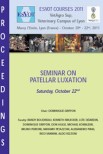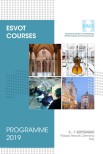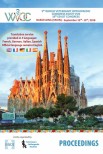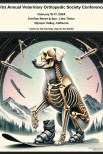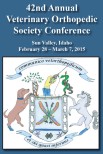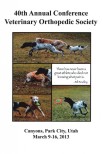Objective—To determine the effects of horse age, osteochondral injury, and joint type on a synthesis biomarker and 3 degradative biomarkers of type II collagen in Thoroughbreds.
Animals—Healthy rested adult (3- to 12-year-old) Thoroughbreds (n = 19), yearling (1- to 2-year-old) Thoroughbreds (40), and Thoroughbred racehorses (2 to 7 years old) undergoing arthroscopic surgery for removal of osteochondral fragments that resulted from training or racing (41).
Procedures—Samples of blood and metacarpophalangeal, metatarsophalangeal, or carpal joint synovial fluid (SF) were collected from all horses. Commercially available assays were used to analyze SF and serum concentrations of type II collagen biomarkers of synthesis (carboxy propeptide of type II collagen [CPII]) and degradation (cross-linked C-telopeptide fragments of type II collagen [CTX II], neoepitope generated by collagenase cleavage of type I and II collagen [C1,2C], and neoepitope generated by collagenase cleavage of type II collagen [C2C]).
Results—Osteochondral injury affected concentrations of CPII, CTX II, C1,2C, and C2C in SF, serum, or both, compared with concentrations in healthy adult horses. Compared with adult horses, yearling horses had increased SF or serum concentrations of degradative biomarkers (CTX II, C1,2C, and C2C). Concentrations were higher in carpal than metacarpophalangeal or metatarsophalangeal joints for all biomarkers in osteochondral-injured horses. Variable differences in SF concentrations between joint types were detected in healthy adult and yearling horses.
Conclusions and Clinical Relevance—Horse age, osteochondral injury, and joint type all significantly affected type II collagen biomarker concentrations in SF and serum of Thoroughbreds.
